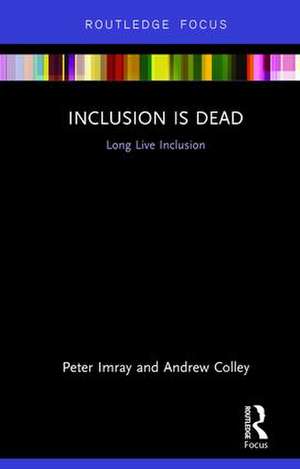Inclusion is Dead: Long Live Inclusion
Autor Peter Imray, Andrew Colleyen Limba Engleză Paperback – 8 mai 2017
Imray and Colley assert that the dominance of inclusion has meant that there has been no serious attempt to look at the educational difficulties faced by learners with PMLD and SLD. As a vision of egalitarianism and equality for all, they say, inclusion is dead.
The authors controversially believe that unless education changes, it will remain as a disabling institution that does the exact opposite of its intention. The book presents the argument that theorists of inclusion have failed to provide practical solutions on how inclusion can be achieved when SLD and PMLD learners are involved, as well as discussing the drawbacks of the ‘inclusion for all argument’.
With up-to-date references throughout, Inclusion is Dead will be an insightful read for teachers and SENCO trainers, as well as postgraduates and undergraduates studying courses on politics, philosophy and society.
| Toate formatele și edițiile | Preț | Express |
|---|---|---|
| Paperback (1) | 285.94 lei 3-5 săpt. | +12.20 lei 5-11 zile |
| Taylor & Francis – 8 mai 2017 | 285.94 lei 3-5 săpt. | +12.20 lei 5-11 zile |
| Hardback (1) | 994.74 lei 6-8 săpt. | |
| Taylor & Francis – 8 mai 2017 | 994.74 lei 6-8 săpt. |
Preț: 285.94 lei
Nou
Puncte Express: 429
Preț estimativ în valută:
54.72€ • 57.27$ • 45.54£
54.72€ • 57.27$ • 45.54£
Carte disponibilă
Livrare economică 10-24 martie
Livrare express 22-28 februarie pentru 22.19 lei
Preluare comenzi: 021 569.72.76
Specificații
ISBN-13: 9781138282148
ISBN-10: 1138282146
Pagini: 132
Ilustrații: 2 Tables, black and white; 2 Line drawings, black and white; 2 Illustrations, black and white
Dimensiuni: 138 x 216 x 8 mm
Greutate: 0.18 kg
Ediția:1
Editura: Taylor & Francis
Colecția Routledge
Locul publicării:Oxford, United Kingdom
ISBN-10: 1138282146
Pagini: 132
Ilustrații: 2 Tables, black and white; 2 Line drawings, black and white; 2 Illustrations, black and white
Dimensiuni: 138 x 216 x 8 mm
Greutate: 0.18 kg
Ediția:1
Editura: Taylor & Francis
Colecția Routledge
Locul publicării:Oxford, United Kingdom
Public țintă
ProfessionalCuprins
1. Setting the Scene 2. What is Educational Inclusion? 3. Current Perspectives and Practice 4. The Defining Learning Characteristics of PMLD and SLD 5. The Pedagogical Imperative 6. The Curriculum Imperative 7. The Capabilities Imperative 8. The Social Imperative 9. Conclusion References
Notă biografică
Peter Imray is an independent trainer, advisor and writer in the area of special educational needs.
Andrew Colley is Senior Lecturer in Special Education at the University of East London, Cass School of Education and Communities.
Andrew Colley is Senior Lecturer in Special Education at the University of East London, Cass School of Education and Communities.
Descriere
Inclusion is Dead is a provocative polemic against the widely held notion that inclusion for all children and young people with SEN is both possible and desirable. For those with severe learning difficulties (SLD) and profound and multiple learning difficulties (PMLD), the authors argue, it is neither.
Imray and Colley assert that the dominance of inclusion has meant that there has been no serious attempt to look at the educational difficulties faced by learners with PMLD and SLD. As a vision of egalitarianism and equality for all, they say, inclusion is dead.
The authors controversially believe that unless education changes, it will remain as a disabling institution that does the exact opposite of its intention. The book presents the argument that theorists of inclusion have failed to provide practical solutions on how inclusion can be achieved when SLD and PMLD learners are involved, as well as discussing the drawbacks of the ‘inclusion for all argument’.
With up-to-date references throughout, Inclusion is Dead will be an insightful read for teachers and SENCO trainers, as well as postgraduates and undergraduates studying courses on politics, philosophy and society.
Imray and Colley assert that the dominance of inclusion has meant that there has been no serious attempt to look at the educational difficulties faced by learners with PMLD and SLD. As a vision of egalitarianism and equality for all, they say, inclusion is dead.
The authors controversially believe that unless education changes, it will remain as a disabling institution that does the exact opposite of its intention. The book presents the argument that theorists of inclusion have failed to provide practical solutions on how inclusion can be achieved when SLD and PMLD learners are involved, as well as discussing the drawbacks of the ‘inclusion for all argument’.
With up-to-date references throughout, Inclusion is Dead will be an insightful read for teachers and SENCO trainers, as well as postgraduates and undergraduates studying courses on politics, philosophy and society.
